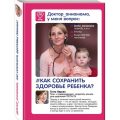Why do children's joints crack?
The most common cause of crunching is the child's growthand the formation of connective and muscle tissue. During this period, some joints are not sufficiently developed and may crunch, but this does not cause pain to the baby and does not limit movement. As a child grows, his joints may crunch. Photo: Getty But there are other reasons for this “behavior” of the joints:
As a child grows, his joints may crunch. Photo: Getty But there are other reasons for this “behavior” of the joints:
- Dysplasia - lag or impaired developmentjoints. The main symptoms are low muscle tone, flat feet, a difference in the length of the legs, soreness in the rotation of the hip, knee and other joints.
- Lack of joint fluid. If the periarthric bag is not enough secret, friction occurs and crunchy sounds appear in the joints. In this case, the child has pain, if he sits in one pose for a long time.
- The inflammatory process in various parts of the musculoskeletal system.
Joints require attention if the baby is limited inmovement, feels pain when bending or spreading the legs, as well as when the skin in the area of the crunching joint is reddened or swollen. You should also see a doctor if a distinct click is heard with each movement.
What if baby’s joints crackle
If as the child grows, the crunching soundjoints has not stopped, you need to consult an orthopedist. Often, it is possible to identify a developmental disorder or disease during an initial examination, based on the child's complaints, but such examinations as:
- General analysis of urine and blood to identify inflammatory processes;
- biochemical blood tests to rule out arthritis, rheumatism and other diseases;
- Ultrasound of joints for the evaluation of the condition of muscles, tendons, cartilage and the amount of intra-articular fluid;
- X-ray for evaluation of the bone apparatus.
All these examinations will help to make an accurateclinical picture and select the appropriate treatment. Despite the fact that joint crunching is alarming for parents, you should not take your child to the doctor at the first signs of it. Observe your child's condition for several days in a row, and if the crunching occurs regularly, show the child to an orthopedist. It is also useful to know:









